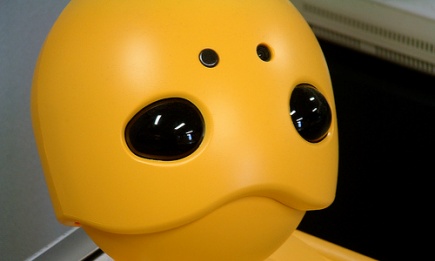Prepare for second Machine Age

“In order to answer the question: ‘what skills do people in the future need, it is not only important to think about skills, it is also important to think about the future. Our image of the future has changed a lot in the past, and will change before it arrives,” Helga Nowotny, former ERC-President and Professor of Social Studies of Science and Technology explains to the attendees of the ‘Skills for the Future’ symposium organized by Royal Netherlands Academy of Arts and Sciences.
Reconsider work
“Like Niels Bohr said: ‘Prediction is very difficult, especially if it’s about the future’. And the future is not what it used to be, it is no longer pre-determined as it always have been in the past. Only as recent as the period between 1750 and 1870, people found out that the future is not pre-determined and that we therefore can do something to make a difference,” Nowotny says.
“Also in our more recent history the presentation of the future has differed greatly. The Club of Rome for example presented us a grim future that would definitely come true if we didn’t take immediate action. Nowadays the future is far more fragile: there are many small fragile possible futures, the big picture of the future is gone.”
John Maynard Keynes’ essay from 1930, ‘’The Economic Possibilities of our Grandchildren”, can be considered the birth of modern predictions, indirectly resulting in modern EU policy documents like ‘New Skills for New Jobs. “Keynes predicted that we would be working only for 3 to 4 hours a day, which led him to the next, important question: what to do the rest of the time?’ Keynes future would turn out quite differently, we work a lot harder and our wealth has therefore also increased.”
In the future, the continuation on this road might no longer be enough. “When white collar routine work will be automatized, large segments of society will become unemployed. This would be a serious blow for the middle-class. Therefore we need an evaluation of the place work takes in our lives and society. We have to remember that work and jobs are two different things.”
“We are entering a second machine age, with an arms race between new technologies and jobs. We need education to prevent jobs and work from disappearing. Others say that we need to self-organize our lives in order to find meaning and income. I already see young people with a day job just for the money and they work in the evening on things they believe really matter or interests them,” Nowotny says.
Tuition fees are a serious threshold
“The key mechanism of Utopia is education, which is good news. We have the highest educated population in history. In the European Union 40 percent possesses a higher education certificate. And education is not only good for our economy; there is very strong demographic evidence that education has a positive effect on our health.”
The question remains: is our current higher education system sustainable and will it bring Utopia closer? “There are severe cuts in R&D in European member states and the US. Another troubling trend is the rising tuition fees in the UK and US. Less people will study because they don’t believe they will earn enough in the future to pay off a debt that large. These debts form a serious threshold for the future of individuals and our society at large,” Nowotny says.
There are more clouds on our educational horizon. “Education is getting more standardized, more of the same content will find its way into curricula and this might eventually lead to la pensée unique. Another trend with possible negative consequences is the rise of the MOOCs, it is likely that it will lead to the squeezing out of universities in the middle, and that is the majority of universities.”
Changing relation skills, information and knowledge
“The free and immediate access to information has changed the way young people see our world. It also changes the way how information, knowledge and skills are relate. Information is everywhere, but students need to learn how to process, select and interpret this abundance of information. Skills are very important, but skills without knowledge will get you nowhere,” Nowotny states.
Nowotny names ‘flexibility’ as one of the most important personal skills for the coming century. In the near future people have to adapt to a changes in their personal life, technology and work. “However, flexibility is only beneficial when you have values. It is important to know when, how and why to be flexible, otherwise all will people will be like jellyfish, without a spine.”
Meest Gelezen
Wederom intimidatie van journalisten door universiteit, nu in Delft
‘Burgerschapsonderwijs moet ook verplicht worden in hbo en wo’
Extra geld voor bètafaculteiten is daar nooit terechtgekomen
Raad van State: laat taaltoets nog niet gelden voor hbo-opleidingen
Vrouwen houden universiteit draaiende, maar krijgen daarvoor geen waardering

